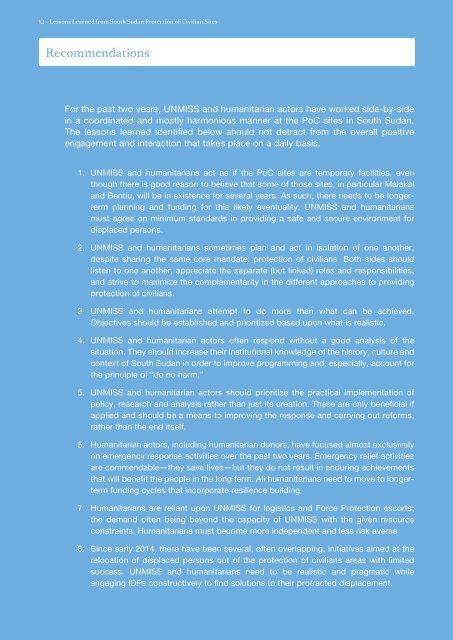Lessons Learned from South Sudan Protection of Civilian Sites 2013–2016
1rTWN7V
1rTWN7V
You also want an ePaper? Increase the reach of your titles
YUMPU automatically turns print PDFs into web optimized ePapers that Google loves.
12 - <strong>Lessons</strong> <strong>Learned</strong> <strong>from</strong> <strong>South</strong> <strong>Sudan</strong> <strong>Protection</strong> <strong>of</strong> <strong>Civilian</strong> <strong>Sites</strong><br />
Recommendations<br />
For the past two years, UNMISS and humanitarian actors have worked side-by-side<br />
in a coordinated and mostly harmonious manner at the PoC sites in <strong>South</strong> <strong>Sudan</strong>.<br />
The lessons learned identified below should not detract <strong>from</strong> the overall positive<br />
engagement and interaction that takes place on a daily basis.<br />
1. UNMISS and humanitarians act as if the PoC sites are temporary facilities, even<br />
though there is good reason to believe that some <strong>of</strong> those sites, in particular Malakal<br />
and Bentiu, will be in existence for several years. As such, there needs to be longerterm<br />
planning and funding for this likely eventuality. UNMISS and humanitarians<br />
must agree on minimum standards in providing a safe and secure environment for<br />
displaced persons.<br />
2. UNMISS and humanitarians sometimes plan and act in isolation <strong>of</strong> one another,<br />
despite sharing the same core mandate: protection <strong>of</strong> civilians. Both sides should<br />
listen to one another, appreciate the separate (but linked) roles and responsibilities,<br />
and strive to maximize the complementarity in the different approaches to providing<br />
protection <strong>of</strong> civilians.<br />
3. UNMISS and humanitarians attempt to do more than what can be achieved.<br />
Objectives should be established and prioritized based upon what is realistic.<br />
4. UNMISS and humanitarian actors <strong>of</strong>ten respond without a good analysis <strong>of</strong> the<br />
situation. They should increase their institutional knowledge <strong>of</strong> the history, culture and<br />
context <strong>of</strong> <strong>South</strong> <strong>Sudan</strong> in order to improve programming and, especially, account for<br />
the principle <strong>of</strong> “do no harm.”<br />
5. UNMISS and humanitarian actors should prioritize the practical implementation <strong>of</strong><br />
policy, research and analysis rather than just its creation. These are only beneficial if<br />
applied and should be a means to improving the response and carrying out reforms,<br />
rather than the end itself.<br />
6. Humanitarian actors, including humanitarian donors, have focused almost exclusively<br />
on emergency response activities over the past two years. Emergency relief activities<br />
are commendable—they save lives—but they do not result in enduring achievements<br />
that will benefit the people in the long term. All humanitarians need to move to longerterm<br />
funding cycles that incorporate resilience building.<br />
7. Humanitarians are reliant upon UNMISS for logistics and Force <strong>Protection</strong> escorts;<br />
the demand <strong>of</strong>ten being beyond the capacity <strong>of</strong> UNMISS with the given resource<br />
constraints. Humanitarians must become more independent and less risk averse.<br />
8. Since early 2014, there have been several, <strong>of</strong>ten overlapping, initiatives aimed at the<br />
relocation <strong>of</strong> displaced persons out <strong>of</strong> the protection <strong>of</strong> civilians areas with limited<br />
success. UNMISS and humanitarians need to be realistic and pragmatic while<br />
engaging IDPs constructively to find solutions to their protracted displacement.


